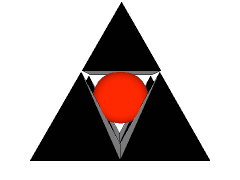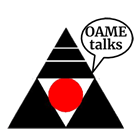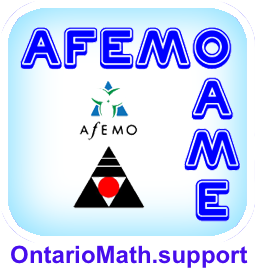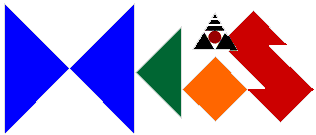President's Message - September 2005
Introducing ... "Growing Up Mathematically," OAME's Vision for Learning Mathematics!!
KATHY KUBOTA-ZARIVNIJ
kkz@oame.on.ca
OAME envisions learning mathematics as a continuum that occurs across all grades levels. If students are to experience learning as connected, teachers can only make this happen if they have an awareness of the mathematics learning that happens before and after their grade level. Elementary teachers often make assumptions about what they should be "preparing" students for in high school and secondary teachers just as often make assumptions about what kinds of experiences students have had in elementary schools.
Therefore, Growing Up Mathematically brings to life the continuum of learning mathematics through glimpses into real classrooms in the video. Teachers can identify and discuss how the use of technology and manipulatives and the development of mathematical communication, reasoning, and problem solving become more sophisticated as students grow up through the years. The classroom-ready mathematics tasks incorporate the development of mathematical skills, knowledge, and processes.
OAME's vision project, Growing Up Mathematically was conceived as an expression of OAME members' shared vision of mathematics education, diversity of mathematics knowledge and experience, and creative possibility. It is based upon the simple idea of a student growing up through the years and what her/his experience in mathematics should be over those years. OAME board and executive members, representing all grade divisions: primary, junior, intermediate, senior, contributed to the creation and field testing of grade-specific, classroom tasks, recording of video images of mathematics learning from K to 11, and the creation of a professional development guide. The classroom experiences and sample student work are intended to be used by teachers and their students as living examples of what mathematics looks like, sounds like, and feels like according to the vision articulated by OAME. These resources can be used as stand-alone pieces or more powerfully as a set of connected components that depend and build upon each other.
The Vision Statement
The OAME vision for learning mathematics was written, reviewed, and revised by members of the Board of Directors and is based upon principles and beliefs that are aligned with those presented in the Ministry of Education curriculum documents. OAME believes that the learning of mathematics is based upon these beliefs and principles.
- Learning is structured around the key concepts of mathematics.
- Learners build on prior knowledge and understanding, and work at a developmentally appropriate level to construct new personal meaning.
- Learners are better able to transfer and to use knowledge meaningfully when new ideas are presented within rich and meaningful learning contexts, and when learners make connections both within and outside of school.
- The learning process is enhanced when new ideas are presented in a variety of ways and when all learners have access to "hands-on" and "minds-on" activities and opportunities. This includes the use of manipulatives, computers, calculators, and hand-held data-collection devices.
- Learning is enhanced when students experience a variety of instructional approaches, ranging from direct instruction to inquiry-based learning.
- Learners require opportunities to interact with each other during the learning process, to teach others, and to explain and justify the processes of mathematics. Learning is enhanced when the learners are encouraged to communicate their understanding.
- Effective mathematics education requires strategies that engage and motivate learners that help students develop positive attitudes about themselves and about mathematics, and that encourage learners to make positive contributions to the learning environment.
- Learning is enhanced when students and teachers understand learning expectations and assessment standards and participate actively in assessing and evaluating their personal growth.
- Learning is enhanced when teaching, coaching, assisting, supporting, and feedback is planned and designed to improve specific learning and mental processing skills and to accommodate different learning styles and needs.
- Learning is enhanced when teachers plan and reflect together.
- Learning is enhanced when all participants in the process are active partners within a community of learners (e.g., parents, educators, students, and the community).
These beliefs and principles are embodied in the Growing Up Mathematically video, mathematics tasks, and professional development guide.
The Video
The video focuses on the process components of mathematics and demonstrates the growing sophistication with which learners use materials, technology, vocabulary, and problem solving strategies. All segments in the video were filmed in five Ontario classrooms spanning the grades from Kindergarten to grade 11.
In these classrooms, students engage in mathematical learning experiences through the use of concrete materials and manipulatives, visuals, technology, and/or math picture books. These students build on their prior knowledge of key mathematical concepts and connect these concepts to their world. They understand the purpose of their learning through clearly defined expectations, goals, and assessment criteria. In the video, these students engage in inquiry, pose questions, and actively discuss their understandings with one another. The video is organized by the following topics: Setting the Stage, Organization Classrooms, Using Manipulatives, Using Technology, Teacher Questioning, Student Communication, Whole Class Debrief, Rich Assessment.
Mathematics Learning Tasks
Classroom ready learning and/or assessment tasks were developed and field tested. Specific teaching/learning and assessment strategies are included. As well, student work samples are provided for each set of tasks, so that teachers and students can see the possibilities of student mathematical thinking and doing. The mathematics tasks included are: Kindergarten - Eleven is Eleven; Grade 1 - Ten Black Dots; Grade 5 - Who Won?; Grade 7/8 - Station-to-Station, Exploring Angle Sums in Polygons; Grade 9 - Bungee Jump, Popcorn: Applied, Popcorn: Academic; Grade 11U/C - The Hula Hoop Experiment: Going Around in Circles, Pendulum: Performance based Assessment; Grade 11C - Decisions, Decisions, Decisions: Summative Assessment.
Professional Development
It is hoped that the vision statement, the video, the classroom learning tasks and the assessment ideas will promote many rich conversations between teachers. The professional development component of this resource is intended to inspire and focus those conversations. There are five professional development modules: Engaging Students in Learning Mathematics, Developing Mathematical Understanding, Developing Mathematical Communication, Consolidating and Sharing, Conversations About Student Work. Each module should take about 50 minutes and can be used in relation to the grade specific mathematics tasks.
Check Out Growing Up Mathematically!
So, think about the possibilities of using OAME's newly released mathematics education resource. The vision statement, video, mathematics learning tasks, and professional development materials could be used to promote conversations about teaching and learning mathematics between and amongst groups of mathematics educators and/or parents. As well, these materials can be used to celebrate the mathematics thinking and doing in which Ontario students and teachers engage!!! Enjoy!
KKZ
Previous Message:
Greetings! And A Special Welcome To New OAME Members!
Next Message:
Knowing Mathematics for Teaching Mathematics


















 Like us on FaceBook
Like us on FaceBook